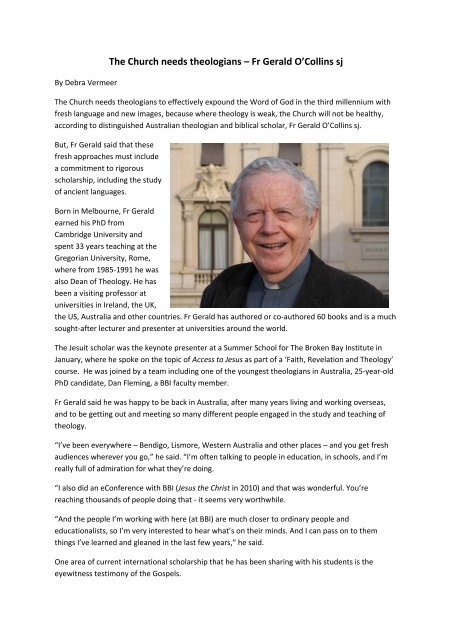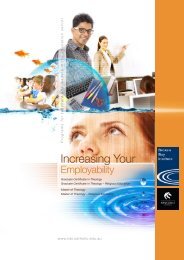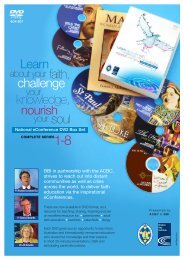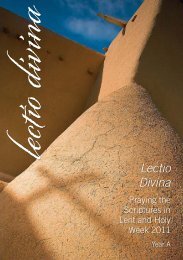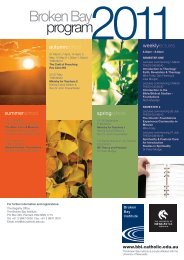Fr Gerald O'Collins sj - Broken Bay Institute
Fr Gerald O'Collins sj - Broken Bay Institute
Fr Gerald O'Collins sj - Broken Bay Institute
You also want an ePaper? Increase the reach of your titles
YUMPU automatically turns print PDFs into web optimized ePapers that Google loves.
By Debra Vermeer<br />
The Church needs theologians – <strong>Fr</strong> <strong>Gerald</strong> O’Collins <strong>sj</strong><br />
The Church needs theologians to effectively expound the Word of God in the third millennium with<br />
fresh language and new images, because where theology is weak, the Church will not be healthy,<br />
according to distinguished Australian theologian and biblical scholar, <strong>Fr</strong> <strong>Gerald</strong> O’Collins <strong>sj</strong>.<br />
But, <strong>Fr</strong> <strong>Gerald</strong> said that these<br />
fresh approaches must include<br />
a commitment to rigorous<br />
scholarship, including the study<br />
of ancient languages.<br />
Born in Melbourne, <strong>Fr</strong> <strong>Gerald</strong><br />
earned his PhD from<br />
Cambridge University and<br />
spent 33 years teaching at the<br />
Gregorian University, Rome,<br />
where from 1985‐1991 he was<br />
also Dean of Theology. He has<br />
been a visiting professor at<br />
universities in Ireland, the UK,<br />
the US, Australia and other countries. <strong>Fr</strong> <strong>Gerald</strong> has authored or co‐authored 60 books and is a much<br />
sought‐after lecturer and presenter at universities around the world.<br />
The Jesuit scholar was the keynote presenter at a Summer School for The <strong>Broken</strong> <strong>Bay</strong> <strong>Institute</strong> in<br />
January, where he spoke on the topic of Access to Jesus as part of a ‘Faith, Revelation and Theology’<br />
course. He was joined by a team including one of the youngest theologians in Australia, 25‐year‐old<br />
PhD candidate, Dan Fleming, a BBI faculty member.<br />
<strong>Fr</strong> <strong>Gerald</strong> said he was happy to be back in Australia, after many years living and working overseas,<br />
and to be getting out and meeting so many different people engaged in the study and teaching of<br />
theology.<br />
“I’ve been everywhere – Bendigo, Lismore, Western Australia and other places – and you get fresh<br />
audiences wherever you go,” he said. “I’m often talking to people in education, in schools, and I’m<br />
really full of admiration for what they’re doing.<br />
“I also did an eConference with BBI (Jesus the Christ in 2010) and that was wonderful. You’re<br />
reaching thousands of people doing that ‐ it seems very worthwhile.<br />
“And the people I’m working with here (at BBI) are much closer to ordinary people and<br />
educationalists, so I’m very interested to hear what’s on their minds. And I can pass on to them<br />
things I’ve learned and gleaned in the last few years,” he said.<br />
One area of current international scholarship that he has been sharing with his students is the<br />
eyewitness testimony of the Gospels.
“After all, Jesus died and rose about 30 AD – well Peter doesn’t die until the 60s,” he said. “Some of<br />
them died earlier and some of them died later, but these eyewitnesses, they’re controlling the<br />
tradition. They’re saying, ‘no, you’ve got it wrong, I was there’ or ‘yes, you’ve got it right’. And some<br />
of these were minor eyewitnesses like Bartimaeus, somebody who was cured by Jesus. Why was he<br />
named in the Gospels? He was named really because he told that story. Or Simon of Cyrene, he<br />
could tell that section of the Passion story – that seems to be the reason why their names are there.<br />
“So there’s a lot of interesting work being done on eyewitness testimony. I feel I can pass on things<br />
about Jesus scholarship, what’s happening there.”<br />
Reflecting on the changes he has seen over the decades, <strong>Fr</strong> <strong>Gerald</strong> said one of the big positive moves<br />
has been the opening up of theological study to more people.<br />
“Well, far more women are studying it, and many more lay people in general, so that’s a major<br />
change. Because theology was mainly a study for people aiming to become ordained priests – and<br />
now all sorts of different people from different walks of life are studying it, so there are a lot of<br />
pluses there,” he said.<br />
“And I think theology is much more aware of the world, of the global village. You can’t do your<br />
Christian theology without thinking of Judaism too and Islam and so forth. I mean theology today is<br />
often taught along with the study of religions.”<br />
<strong>Fr</strong> <strong>Gerald</strong> welcomed the modern pastoral application of theology but urged students not to overlook<br />
the more rigorous academic pursuits that underpin good scholarship.<br />
“The one thing I suppose I’m a bit concerned about is, that about 50 years ago people were willing to<br />
spend a lot of their life in libraries, learning the languages, the ancient languages and the modern<br />
ones. And really, I don’t think there are as many willing to do that now,” he said. “I can understand<br />
that. They find it so tough that they want to have some pastoral ministry in their lives and so forth ‐<br />
a theology that’s practiced and preached. But we have to have the other people that know Aramaic<br />
and Hebrew very well and the other ancient languages, and read Spanish and German and <strong>Fr</strong>ench,<br />
otherwise it's not the full picture. That’s a concern of mine, that tough scholarship ‐ and that very<br />
often involves languages ‐ is falling away.”<br />
But, he said the growth in people studying theology was good news, because the need for<br />
theologians was as strong as ever.<br />
“The Church needs theologians ‐ it needs all kinds of things ‐ but where theology is weak I don’t<br />
think you’re going to have a healthy church,” <strong>Fr</strong> <strong>Gerald</strong> said.<br />
And, he said, theology had to keep moving forward, while always grounding itself in scripture and<br />
tradition.<br />
“People talk about Vatican II changing things, well it did, but some of those changes were retrievals.<br />
The Second Eucharistic prayer is retrieved from the 3 rd century, it’s the earliest Eucharistic prayer<br />
that we have. Those changes are often beautiful, wonderful retrievals.
“But theology that is just repetition is no real theology. I mean we have to expound the Word of God<br />
in the third millennium with fresh language and new images. The best of theology has been like<br />
that.”<br />
A prolific author, <strong>Fr</strong> <strong>Gerald</strong> has more books in the pipeline, including a book on Vatican II and other<br />
religions, which is due to be completed later this year and published in 2013. He has also written the<br />
first volume of his autobiography, A Midlife Journey (to be published around June 2012 by Connor<br />
Court Publishing), and has co‐edited a book on Christ with a group of scientists and theologians.


